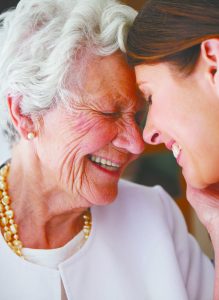 When cancer occurs, the patient’s loved ones and friends must also come to grips with the emotional issues surrounding the disease. Additionally, one of them may need to step forward and assume the role of caregiver―a challenging job that can be extremely demanding at times.
When cancer occurs, the patient’s loved ones and friends must also come to grips with the emotional issues surrounding the disease. Additionally, one of them may need to step forward and assume the role of caregiver―a challenging job that can be extremely demanding at times.
Today 80 percent of all cancer treatment occurs on an outpatient basis in community-based cancer centers, rather than in a hospital. Consequently, most cancer patients are going to need help at home with day-to-day chores at some point in their care. As treatment progresses, the patient may need assistance with meals, dressing, bathing and housekeeping, as these activities can be exhausting to an already fatigued patient. They may also need help managing various treatment side effects. Obviously, this is not the time for a patient to be left alone.
“Caregivers are a vital part of the care team, handling the essential tasks patients can no longer manage on their own,” explained Dr. David J. Catalano, medical director and radiation oncologist at ICCC in Lady Lake, Fla. “They truly are the unsung heroes of cancer care who everyday put aside their own needs to help their loved one. While everyone’s focus tends to be on the patient, it is important to encourage caregivers to take care of themselves as well.”
Tips for caregivers
There are many things caregivers can and should do to help avoid burn out, depression, exhaustion and other problems they commonly face. The American Cancer Society and the National Cancer Institute have a wealth of valuable information online, and many other organizations also have helpful suggestions. If you are caring for a loved one, here a few things to consider:
• First and foremost, seek help from family members or friends. It is unrealistic to think one person can handle this responsibility 24/7 week after week in addition to their own personal commitments. If no one else is available, check with churches and civic organizations, as they may have volunteers who can help. Private companies also offer respite services, temporary relief which may be covered by Medicare, Medicaid or other insurance plans. The patient’s care team may also be able to help identify resources to assist with home care.
• Take care of yourself by eating a healthy diet, getting enough rest, exercising when possible and spending a little time each day doing something you enjoy to take your mind off of your responsibilities.
• Don’t isolate yourself. Connect often with friends and plan some fun activities with them. Reach out to them for support or just good conversation.
• Don’t blame yourself when treatment decisions are made and things don’t turn out as expected. Caregivers are often overwhelmed with guilt wondering if they made the right choices. Realize it is extremely difficult to make care decisions for another person and that you made the best decision you could with the information you had at the time.
• Save time and energy for your spouse or partner and focus on things besides cancer, as caregiving can strain even the best relationships.
The Rewards of Being a Caregiver
In spite of the exhausting challenges of caregiving, it can enrich a person’s life. Caregivers often feel a sense of satisfaction knowing they helped their loved one in a time of great need. Additionally, caregiving often brings people closer together and enables them to gain greater perspective on their relationship and the purpose of their own life.
“Caregiving is probably one of the most challenging things a person will ever do,” said Dr. Catalano. “Caregivers need to learn ways to take care of themselves, because if they aren’t taking care of themselves, they can’t properly take care of anyone else. They shouldn’t be afraid to ask for help, as no one can do this job alone.”
ABOUT INTERCOMMUNITY CANCER CENTER
InterCommunity Cancer Center (ICCC) has more than 30 years of experience providing quality, personalized cancer care in the Lady Lake and Leesburg communities and has treated more than 10,000 patients. Medical Director and Radiation Oncologist Dr. David J. Catalano has expertise in treating breast, lung, prostate, gynecologic, skin and other cancers.
ICCC is an affiliate of The US Oncology Network (“The Network”). This collaboration unites ICCC with more than 1,400 independent physicians dedicated to delivering value-based, integrated care for patients — close to home. Through The Network, these independent doctors come together to form a community of shared expertise and resources dedicated to advancing local cancer care and to delivering better patient outcomes. The US Oncology Network is supported by McKesson Specialty Health, whose coordinated resources and infrastructure allow doctors in The Network to focus on the health of their patients, while McKesson focuses on the health of their practices. For more information, visit www.usoncology.com.
Lady Lake cancer Center
(352) 647-6300
LadyLakecancerCenter.com
Check Also
Recurrent UTIs: Addressing the Risk of Antibiotic Resistance
Urinary tract infections (UTIs) are common bacterial infections that affect millions of individuals worldwide each …
 Central Florida Health and Wellness Magazine Health and Wellness Articles of the Villages
Central Florida Health and Wellness Magazine Health and Wellness Articles of the Villages



